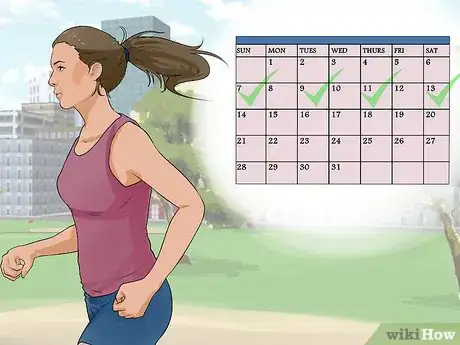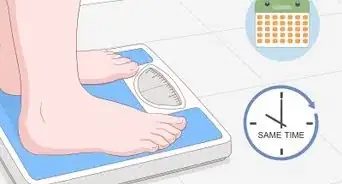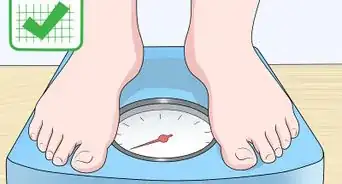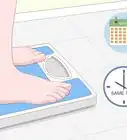This article was co-authored by Julian Arana, M.S.eD., NCSF-CPT. Julian Arana is a Personal Trainer and the Founder of B-Fit Training Studios, a personal training and wellness set of studios based in Miami, Florida. Julian has over 12 years of personal training and coaching experience. He is a certified personal trainer (CPT) by the National Council on Strength and Fitness (NCSF). He has a BS in Exercise Physiology from Florida International University and an MS in Exercise Physiology specializing in strength and conditioning from the University of Miami.
wikiHow marks an article as reader-approved once it receives enough positive feedback. In this case, 100% of readers who voted found the article helpful, earning it our reader-approved status.
This article has been viewed 101,730 times.
Many people who work night shifts have trouble losing weight or keeping off unwanted weight. There are several reasons for this. When you are fatigued, you tend to crave calories that are often in the form of junk food. Also, some research indicates that the interruption of circadian rhythms associated with the late night shift may have a negative effect on the metabolism. While weight loss can be more difficult if you're constantly working late shifts, it's not impossible. Adjustments to your eating habits, exercise habits, and sleep patterns can help you control your weight despite working nights.
Steps
Altering Your Eating Habits
-
1Stock your home with healthy foods. Fatigue can make your body crave junk food heavy in processed carbs and sugars. You may feel you deserve a treat after a long night, so you'll be unlikely to reach for unhealthy foods. Make sure this is not an option. Keep your home stocked with healthy snacks for when you get off work.[1]
- Healthy snacks include fruits, vegetables, and spreads like hummus.
- Prepare food in an easily snack-able form so you don't have to waste time preparing when you're tired from work. Cut fruits and vegetables into slices before leaving for work. You can also buy pre-cut fruits and veggies at the supermarket if you have a particularly long week.
-
2Eat breakfast. Even if you sleep in late, you should always have breakfast. Within one hour of waking up, make sure that you eat a healthy meal. This can help rev your metabolism for the coming day.
- Try oatmeal and fruit, or healthy proteins like hard boiled eggs.
Advertisement -
3Bring meals from home. If you're exhausted from working late, the 24 hour McDonald's across from your office may seem like a well-deserved treat at 3 AM. However, part of the reason night shift workers gain weight is because of unhealthy eating habits like these. If you need a meal during your shift, prepare a meal at home before work.
- Make sure any meal you bring is healthy. Strive for meals rich in lean protein, whole grains, fruits, and vegetables.
- You should also bring in your own snacks. This will help you avoid unhealthy vending machine foods during your shift.
-
4Snack healthily throughout a late shift, if possible. Metabolism tends to slow down if you wait until you're extremely hungry to eat. Due to the unusual schedule, night shift workers often end up eating when they're already famished. Not only does this have a poor effect on the body, it's a cause for post-shift overeating and can make you feel sluggish on the job. Opt for light snacks between meal times and, when it's time for your dinner break, stick to a low calorie, healthy meal.[2]
- Pick filling, wholesome snacks such as nuts and fruits, not chips or cookies.
-
5Drink water at work. Many people mistake thirst for hunger, so make sure that you stay hydrated during your shift. Dehydration can lead to food cravings and overeating, which can cause you to pack on the pounds when working a night shift.[3]
- Purchase a water bottle and fill it before your shift. This will cut down on the cost of purchasing bottled water at work. Refill the bottle at a water fountain when necessary.
- If you're not a big water drinker, consider infusing your water with fruit to add flavor. For example, you can add a squeeze of lemon or toss a few berries into your water bottle. This may also add a small amount of calories to your drinks, cutting back on the urge to snack or overeat. Using flavor mixes or additives adds unnecessary sugar and coloring.
-
6Strive to eat at the same time each day. It can be hard to maintain a regular eating schedule when you're working a night shift. However, it's vital you do so if you want to lose weight. Your body learns to expect food at certain times. If you're working a late shift, your eating habits may be erratic. If you shift your eating schedule during weekends or days off, your body never has time to fully adjust to an eating schedule. This may cause weight gain.
- Try to eat at specific times each day. For example, if you get up at 1:30PM, make sure to eat breakfast by 2PM. Even on weekends or days off, when you may get up earlier, strive to eat at 2PM.
- This can be difficult when it comes to socializing. For you, dinnertime may be around midnight, but your friends may be getting together for food at 7PM on a Saturday. Show up and have a drink or a light appetizer instead of a full meal.
Making Time for Exercise
-
1Exercise at work, if possible. Moving more throughout your shift can help you keep unwanted weight off. If possible, opt for light exercise during your night shift. Not only will this help you burn more calories, it could help you sleep better at night.[4]
- For example, you can take walks during your breaks, walk up and down stairs during spare moments, or do stretches in your cubicle or office.
-
2Work time for exercise into your schedule. Many people who work night shifts have an erratic schedule. Due to this, you may have trouble making time in your routine for exercise. However, if you want to lose weight, regular exercise needs to be part of your schedule.[5]
- Find a time that works for you to exercise. Exercising after work is probably not practical, and may actually be dangerous if you're jogging on the street at 3AM. However, see if you can find time in the afternoon.
- Look for gaps in your schedule. Say you get to bed by 4AM on most nights, and tend to sleep until one. Your shift typically starts at nine o'clock. You could find some time during the afternoon to get in 45 minutes of aerobics a few times a week.
-
3Get an appropriate amount of exercise in each week. For weight loss, it's recommended you get in 150 minutes of moderate physical activity or 75 minutes of intense physical activity each week. Make sure you hit those numbers by exercising three to four times a week.[6]
- Choose an activity you like and are likely to stick to. If you loathe running, jogging will probably not be your best route to weight loss. However, if you love riding your bike, make time for an afternoon bike ride a few times a week.
- You can find ways to make working out less tedious. Listen to music while you jog or use your treadmill. Watch television at the gym to make the time go by faster.
-
4Ease into a workout routine if you've been inactive for awhile. It's a bad idea to jump into a vigorous exercise routine if you've been inactive for a while. Ease into any workout routine slowly. For example, if you want to start running, begin with walking and slow-paced jogging before you begin to sprint.
- You should also talk to your doctor before beginning a new form of exercise. You want to make sure you do not strain yourself.
Maintaining a Healthy Sleep Schedule
-
1Get enough sleep. People who do not get enough sleep have trouble sticking to exercise schedules. This can be due to increased fatigue. If you tend to skip out on quality sleep, this can be a barrier to weight loss.[7] You need about seven to nine hours of sleep a day.[8]
- You may feel the need to unwind after a night shift. However, if you get home at 3am and play video games until 5am, you may end up skipping out on high quality sleep.
- Set a bedtime for yourself and stick to it. Even if it's difficult, having a set bedtime can help you manage your schedule and help stave off weight gain.
-
2Limit caffeine consumption at the end of each shift. Working the night shift can be exhausting. However, bingeing on caffeine late at night can make sleep impossible. Avoid going for coffee and energy drinks towards the end of your shift so you don't go home wired and unable to sleep.[9]
-
3Find a way to shut your mind off after work. If your mind is racing with thoughts from work, you need to find a way to shut your brain down. Make a relaxing bedtime ritual for yourself. This can help you wind down and fall asleep.[10]
- Something you find personally calming can help. For example, taking a warm bath may be a good idea. Reading can also take your mind off of the moment, promoting sleep.
- You should stay away from electronic screens before bed. The blue light that comes from a laptop or phone stimulates brain activity, making sleep difficult.
- Stay consistent. If you engage in the same ritual every night, your body will learn to associate that routine with sleep. This will help encourage your brain and body to shut down for rest.
Expert Q&A
-
QuestionHow can I encourage myself to exercise in the morning?
 Julian Arana, M.S.eD., NCSF-CPTJulian Arana is a Personal Trainer and the Founder of B-Fit Training Studios, a personal training and wellness set of studios based in Miami, Florida. Julian has over 12 years of personal training and coaching experience. He is a certified personal trainer (CPT) by the National Council on Strength and Fitness (NCSF). He has a BS in Exercise Physiology from Florida International University and an MS in Exercise Physiology specializing in strength and conditioning from the University of Miami.
Julian Arana, M.S.eD., NCSF-CPTJulian Arana is a Personal Trainer and the Founder of B-Fit Training Studios, a personal training and wellness set of studios based in Miami, Florida. Julian has over 12 years of personal training and coaching experience. He is a certified personal trainer (CPT) by the National Council on Strength and Fitness (NCSF). He has a BS in Exercise Physiology from Florida International University and an MS in Exercise Physiology specializing in strength and conditioning from the University of Miami.
Certified Personal Trainer Get ready the night before! So before you go to bed, set your workout clothes out so you don't have to wander around for them. If you are using any exercise equipment, like a medicine ball or jump rope, set it out in a really obvious location so you see it after you wake up. This will work kind of like a reminder and you'll be more likely to work out in the morning.
Get ready the night before! So before you go to bed, set your workout clothes out so you don't have to wander around for them. If you are using any exercise equipment, like a medicine ball or jump rope, set it out in a really obvious location so you see it after you wake up. This will work kind of like a reminder and you'll be more likely to work out in the morning. -
QuestionCan we do the workout first and then go to sleep?
 Michele DolanMichele Dolan is a BCRPA certified Personal Trainer in British Columbia. She has been a personal trainer and fitness instructor since 2002.
Michele DolanMichele Dolan is a BCRPA certified Personal Trainer in British Columbia. She has been a personal trainer and fitness instructor since 2002.
Certified Fitness Trainer Yes. Definitely. Many people find that exercise helps them relax and clear their heads. If that's you, exercising after work makes good sense. If you are outside after dark, be sure to wear reflective clothing and consider wearing a head lamp or carrying a light. Also consider exercising with a work colleague, so you are not out alone.
Yes. Definitely. Many people find that exercise helps them relax and clear their heads. If that's you, exercising after work makes good sense. If you are outside after dark, be sure to wear reflective clothing and consider wearing a head lamp or carrying a light. Also consider exercising with a work colleague, so you are not out alone.
Warnings
- Check with your doctor before beginning any workout or diet program.⧼thumbs_response⧽
References
- ↑ https://sleepfoundation.org/shift-work/content/tips-healthy-eating-and-exercising-when-working-shifts
- ↑ https://sleepfoundation.org/shift-work/content/tips-healthy-eating-and-exercising-when-working-shifts
- ↑ https://sleepfoundation.org/shift-work/content/tips-healthy-eating-and-exercising-when-working-shifts
- ↑ https://sleepfoundation.org/shift-work/content/tips-healthy-eating-and-exercising-when-working-shifts
- ↑ https://www.thehealthsite.com/fitness/unable-to-lose-weight-due-to-night-shift-fitness-query-of-the-day-53321/
- ↑ http://www.mayoclinic.org/healthy-lifestyle/weight-loss/basics/diet-and-exercise/hlv-20049483
- ↑ https://www.psychologytoday.com/blog/thriving101/201406/why-losing-weight-may-be-harder-night-owls
- ↑ https://sleepfoundation.org/shift-work/content/tips-healthy-eating-and-exercising-when-working-shifts
- ↑ https://sleepfoundation.org/shift-work/content/tips-healthy-eating-and-exercising-when-working-shifts
About This Article
To lose weight when you're working nights, try to toss out any unhealthy foods you have in your fridge or pantry, since fatigue can make you crave junk food. Instead, keep your kitchen stocked with healthy snacks, like fruits, vegetables, and hummus, which will help you get the nutrients you need without the empty calories. You should also make sure you're eating breakfast every day, even if you sleep in late, since breakfast can kickstart your metabolism and help you burn calories. If you usually eat unhealthy during your night shift, like getting fast food, try preparing healthy meals in advance and bringing them to work with you. Even though it can be hard to fit exercise into your schedule, try to find time to get in 30 minutes of exercise every day, like in the afternoon before you go to work. For tips from our Personal Trainer co-author, like how to maintain a healthy sleep schedule when you work nights, keep reading!











































































